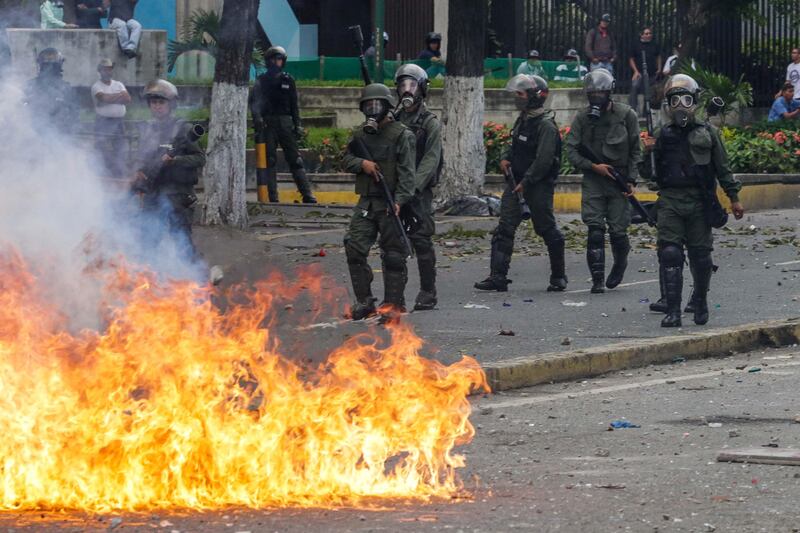Venezuela's opposition called a fresh 48-hour general strike against embattled president Nicolas Maduro's plans to have the constitution rewritten giving him broader powers.
"We are calling out the entire [Venezuelan] people, all groups in society, for a 48-hour strike" Wednesday and Thursday lawmaker Simon Calzadilla said.
With anti-government marchers still clearing streets Saturday, Mr Calzadilla said that the strike would be capped on Friday with a march demanding that Mr Maduro officially scrap his planned Constituent Assembly vote. It is scheduled for July 30.
Earlier police on motorcycles fired tear gas to break up an opposition march on the Supreme Court to press demands that elected socialist Maduro leave office, as months of sometimes deadly anti-government demonstrations showed no signs of abating.
That rally was also meant as a show of support for a slate of 33 magistrates - a so-called shadow supreme court - whose names were put forward Friday by the opposition to replace Venezuela's current high court, which is closely allied with Mr Maduro and frequently rules in his favor.
Emboldened by a nationwide strike on Thursday that paralysed parts of the capital Caracas and other Venezuelan cities, opposition leaders held a mock swearing-in ceremony Friday for the shadow court's new "judges".
Many of the actual court's justices were hastily appointed shortly before by Mr Maduro's ruling party lost its majority in congress.
The shadow court has strong support from the demonstrators, organisers said Saturday.
"Everyone has given their backing to the new Supreme Court," tweeted Freddy Guevara, a leader of the opposition-led congress.
"We support the new judges because they will restore independence to the Supreme Court," said 43-year-old demonstrator Luis Torrealba, marching with his wife and teenage son.
In Saturday's march, hundreds of people took to a key Caracas motorway to head downtown toward the court building. But uniformed National Guard troops riding motorcycles fired tear gas to disperse them.
Wuilly Arteaga, a violinist who has become a celebrity for playing at many opposition marches, was injured and taken to a clinic. The 23-year-old was seen with blood pouring from cuts on the left side of his face. He said later he had been struck with buckshot.
"They are not going to frighten me," Mr Arteaga said in a video he posted on Twitter. He is seen in a hospital bed with bandages on his face and swollen lips. "We are going to keep fighting."
The Venezuelan intelligence service arrested one of the shadow judges, Angel Zerpa Aponte, the opposition-controlled National Assembly said on Twitter.
The swearing-in of a shadow judiciary was condemned by the government as "incitement to subversion" and an act of "treason", and officials threatened to throw the dissidents into prison.
Venezuela is in the throes of a political and economic crisis that has led to shortages of basic goods and soaring inflation.
With the situation already inflamed, the stakes have risen further, after the US threatened economic sanctions if Mr Maduro proceeds with a controversial July 30 election of a body to rewrite the constitution.
The president has vowed to maintain the July 30 election of 545 members to the "Constitutional Assembly".
Saturday's protests, like many others since April, were organised by the Democratic Unity Roundtable, a coalition of political opposition groups.
The number of deaths in protests across the country since April has reached 103 — about one fatality per day.






